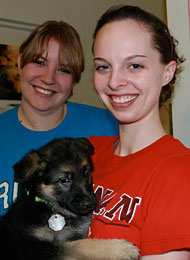A Few Good Dogs
A Few Good Dogs

"And they called it puppy love..."
Don't remember that old Donny Osmond ditty? Not a problem. For this story you don't have to.
That's because you can experience puppy love all across campus and it has nothing to do with first impressions, sweaty palms or that cute so-and-so sitting across from you.
This puppy love is borne of doggy breath, fuzzy pink bellies, four little legs and razor-sharp teeth.
It's also borne of dedication, commitment and selflessness.
Since 2003, members of the Rowan community have raised Seeing Eye puppies - nascent guide dogs for the blind - from about seven weeks old until they are 18 months. The puppies, on loan from The Seeing Eye in Morristown, then return to the academy for formal dog-guide training.
The oldest guide-dog organization in the world, The Seeing Eye has puppy-raising programs at only three universities - Rowan, Rutgers and the University of Delaware.
Rowan Senior Kari Mastromonica recently got her third guide-dog-in-training, a fuzzy poof of a pup named Russ, a gray-black German shepherd.
"I never had a dog (as a child) but I always wanted one," she said, Russ yawning like a snake in the crook of her arm. "I think that's why I was drawn to this program."
Essentially, the job of puppy raisers is to socialize them as much as possible. Kari and her roommate, sophomore Meg Esola, take Russ pretty much everywhere - to class, concerts, sporting events, even assemblies.
"When they're this little we can't really discipline him much," Kari said of the training. "We mostly just praise him a lot if he does what we want him to do - go to the bathroom outside or chew on his toy instead of us or our shoes."
Guide Dog In Training
It's early February, the start of the spring semester, and they've only had Russ about a week, but already his presence dominates their on-campus apartment.
There's a string of jingle bells hung low on a wall in the kitchen that Kari and Meg are training Russ to ring when he needs to go out.
There's a bin of puppy food near another wall and, above it, a cardboard sign posting feeding times and how much to give him.
And, on the door to one bedroom, a simple sign declares: "We love Russ."
"I actually was terrified of dogs when I was younger," said Meg, 19, an elementary ed major from Cherry Hill.
Since then she's stared down her fear and grown to love dogs. She volunteered at a dog shelter and, for the fall 2007 semester, moved in with Kari to be part of the puppy program.
Kari, who raised another shepherd named Al her sophomore year and Walden, a Labrador/golden retriever mix as a junior, acknowledged it's hard giving the pups up once she's come to love them.
"You just go into it from the beginning knowing he doesn't belong to you," she said. "I think I cried only once. I had a talk with Walden before he left and told him he's going to do such great things. And the day he left I wasn't even sad. I was just proud."
Kari said it wasn't just a feeling but that she knew, first hand, that Walden, Al and, now, Russ were destined for big things.
"One of the most important things they learn is intelligent
disobedience," she said. "If the person is walking into the street
and a car is coming, the dog will refuse to walk into it. My
boyfriend is blind and his Seeing Eye dog has saved him three
times."
Working Five to Nine
George Brelsford, Associate Vice President of Student Affairs and Dean of Students, started the puppy-raising program at Rowan in 2003 with his wife Robin after raising one themselves.
"We now raise five to nine puppies per year," Dean Brelsford said. "This year our students have six and we're awaiting delivery of the seventh."
He believes the puppies add an unusual dynamic to campus life and provide a unique learning experience for the students who raise them.
"It provides an opportunity for a long-term community service
experience," he explained. "Normally when a student does community
service they go in, clean up the park and that's it. Here the
students report that they have to become more outgoing. They
interact with a larger percentage of the campus community and often
become more involved than they would have."
"Not now, I'm working"
Bonnie Lannom, a spokesperson for The Seeing Eye, said the university environment is ideal for socializing future guide dogs because it exposes the puppies to so many situations.
Still, she cautioned that if people see a working guide dog, on campus or anywhere else, to leave him be no matter how cute or friendly he appears.
"You never want to pet a dog that's in harness because it's a
distraction," she said. "The dog is working and needs to focus on
what he's doing."